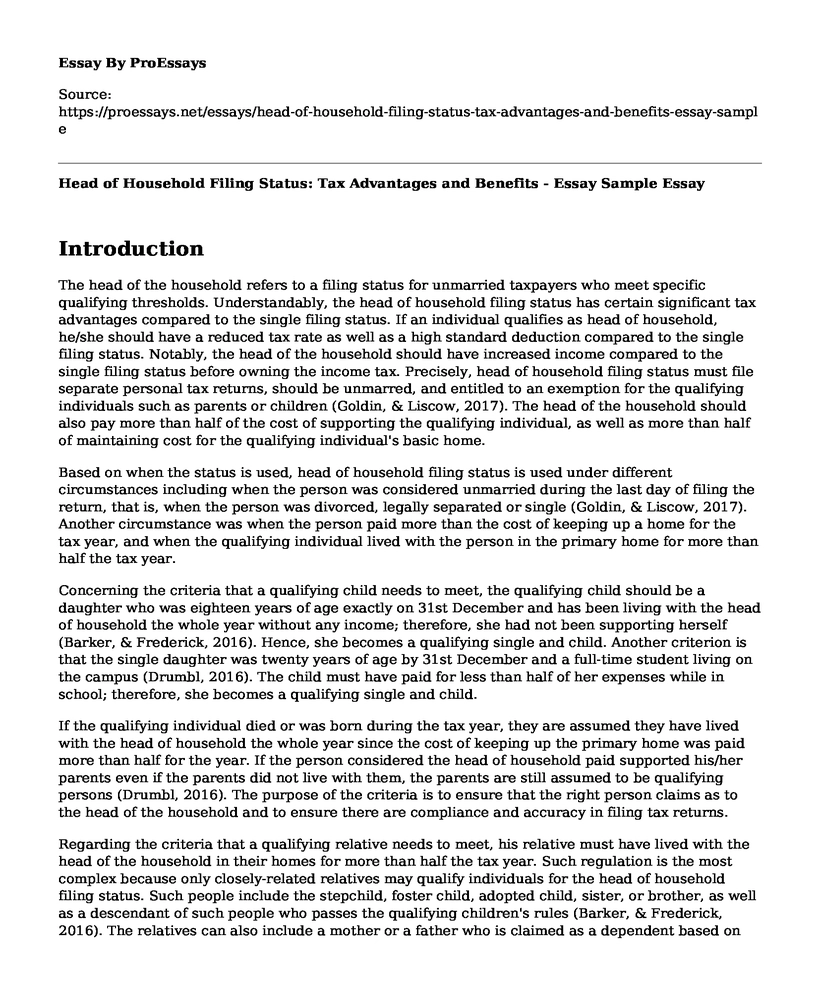Introduction
The head of the household refers to a filing status for unmarried taxpayers who meet specific qualifying thresholds. Understandably, the head of household filing status has certain significant tax advantages compared to the single filing status. If an individual qualifies as head of household, he/she should have a reduced tax rate as well as a high standard deduction compared to the single filing status. Notably, the head of the household should have increased income compared to the single filing status before owning the income tax. Precisely, head of household filing status must file separate personal tax returns, should be unmarred, and entitled to an exemption for the qualifying individuals such as parents or children (Goldin, & Liscow, 2017). The head of the household should also pay more than half of the cost of supporting the qualifying individual, as well as more than half of maintaining cost for the qualifying individual's basic home.
Based on when the status is used, head of household filing status is used under different circumstances including when the person was considered unmarried during the last day of filing the return, that is, when the person was divorced, legally separated or single (Goldin, & Liscow, 2017). Another circumstance was when the person paid more than the cost of keeping up a home for the tax year, and when the qualifying individual lived with the person in the primary home for more than half the tax year.
Concerning the criteria that a qualifying child needs to meet, the qualifying child should be a daughter who was eighteen years of age exactly on 31st December and has been living with the head of household the whole year without any income; therefore, she had not been supporting herself (Barker, & Frederick, 2016). Hence, she becomes a qualifying single and child. Another criterion is that the single daughter was twenty years of age by 31st December and a full-time student living on the campus (Drumbl, 2016). The child must have paid for less than half of her expenses while in school; therefore, she becomes a qualifying single and child.
If the qualifying individual died or was born during the tax year, they are assumed they have lived with the head of household the whole year since the cost of keeping up the primary home was paid more than half for the year. If the person considered the head of household paid supported his/her parents even if the parents did not live with them, the parents are still assumed to be qualifying persons (Drumbl, 2016). The purpose of the criteria is to ensure that the right person claims as to the head of the household and to ensure there are compliance and accuracy in filing tax returns.
Regarding the criteria that a qualifying relative needs to meet, his relative must have lived with the head of the household in their homes for more than half the tax year. Such regulation is the most complex because only closely-related relatives may qualify individuals for the head of household filing status. Such people include the stepchild, foster child, adopted child, sister, or brother, as well as a descendant of such people who passes the qualifying children's rules (Barker, & Frederick, 2016). The relatives can also include a mother or a father who is claimed as a dependent based on the relative qualifying rules, and a sister, brother, niece, nephew or grandparent who can claim to be dependent under the relative qualifying rule (Barker, & Frederick, 2016). The purpose of such criteria is to ensure that the right persons become the qualifying relatives and head of household filing status.
References
Barker, J., & Frederick, C. (2016). Billions Lost Yearly To Earned Income Tax Credit: Errors Or Fraud?. Journal of Business & Economics Research (JBER), 14(4), 145-152. https://www.clutejournals.com/index.php/JBER/article/view/9803
Drumbl, M. L. (2016). Joint Winners, Separate Losers: Proposals to Ease the Sting for Married Taxpayers Filing Separately. Fla. Tax Rev., 19, 399. https://heinonline.org/HOL/LandingPage?handle=hein.journals/ftaxr19&div=23&id=&pa
Goldin, J., & Liscow, Z. (2017). Beyond Head of Household: Rethinking the Taxation of Single Parents. Tax L. Rev., 71, 367. https://heinonline.org/HOL/LandingPage?handle=hein.journals/taxlr71&div=13&id=&pa
Cite this page
Head of Household Filing Status: Tax Advantages and Benefits - Essay Sample. (2023, May 02). Retrieved from https://proessays.net/essays/head-of-household-filing-status-tax-advantages-and-benefits-essay-sample
If you are the original author of this essay and no longer wish to have it published on the ProEssays website, please click below to request its removal:
- International vs. U.S. Standards
- Banker's Acceptance - Essay Sample
- Neural Network Application in Insurance Industry Essay Example
- Essay on PCAOB: Regulating Independent Audits in the US Since 2002
- Essay Sample on Cryptocurrency: Digital Asset Revolutionizing Financial Transactions
- Paper Example on Poor Communication in Banking: Impact on Employee Morale, Ethics, & Performance
- Essay Sample on Medicare Basics: What's Covered & Not Covered







